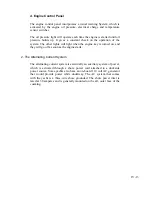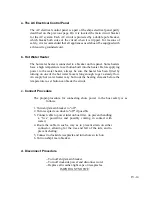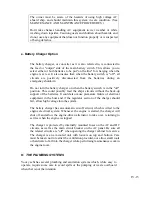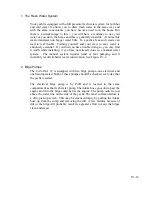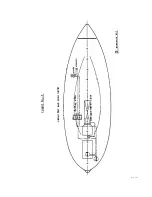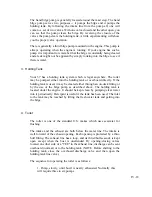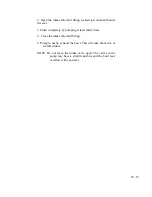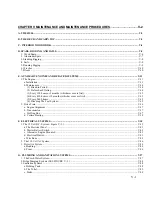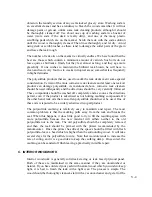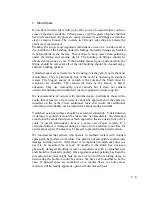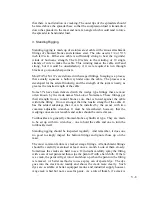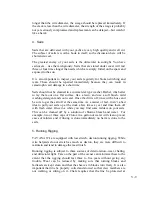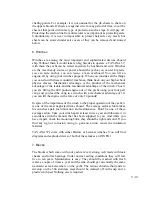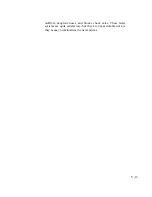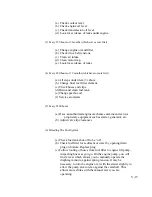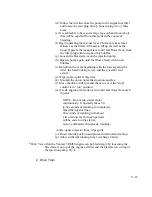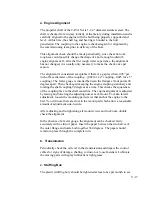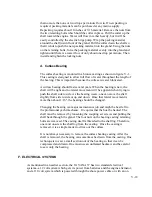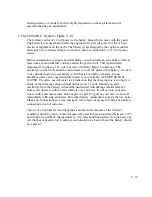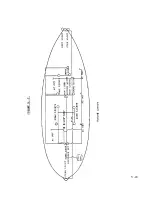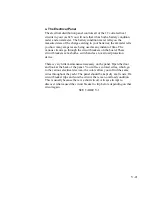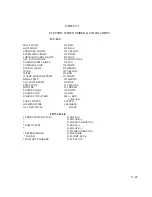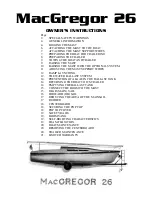
V-7
2. Aluminum Spars
The primary advantage of aluminum spars is the reduction in maintenance.
One should not conclude, however, that aluminum spars are maintenance
free. Like fiberglass, aluminum requires constant and conscientious care if its
appearance is to be maintained. Again, as with fiberglass, if damage to
finishes does occur, one is not quite so pressed to get a repair done because
further deterioration is not likely.
The aluminum spars with a TAYANA 37 may be finished either by
anodizing or painting. Anodizing is a process by which a protective coating
is formed which is superior to paint. It is done in a special bath before any of
the fittings have been installed. Anodizing cannot be renewed by the yacht
owner. Painted spars are maintained in much the same way as painted
wooden spars. Generally, the paint used is polyurethane, a very hard, color
fast paint. Maintenance consists of watching for scrapes and gouges and
repainting them when they occur. A small spray can of automobile finish is
very handy for this purpose. Simply remove the damaged paint, then sand
lightly with about a 300 grit wet or dry sandpaper, and spray on the new
finish.
Aside from physical damage, owing to impact or scraping, the greatest cause
for damage on an aluminum spar is galvanic corrosion. Any nonaluminum
fitting that is bolted, screwed, or riveted to an aluminum spar must be bedded
just as was the case with wood spars. The bedding, in this case, acts as an
electrical insulator rather than as a means of keeping water from behind the
fitting. If dissimilar metals are not isolated from the aluminum, one will soon
find that the aluminum pits and forms a fine powder. This is nonreversible
damage that must be avoided at all costs. If it is discovered, the fitting or
fastener around the corroded area must be removed and reinsulated with a
bedding compound or a sheet insulation such as neoprene or rubber. The
pitted area may be filled with epoxy or polyester putty before repainting, but
this is only cosmetic--the putty will not restore the lost strength in the
damaged area.
One must consider that an aluminum mast that has been badly dented is no
longer safe. Dents that are half an inch or more in depth and which have a
diameter of a third or more of the spar constitute a serious weak point. If the
spar is put under serious stress at that point, the chances are that the section
will collapse. If you should find a dent that large, contact a professional
yacht rigger for advice.
Mast spreaders are particularly critical to the health of your rig. They allow
the long upper shrouds to take up the loads that are transmitted to the upper
part of the mast during sailing. As a result, they are under tremendous
compression. It is particularly critical that they be examined regularly to see
Содержание 37
Страница 1: ...Chapter I OPERATIONS AND MAINTENANCE MANUAL Chapter 1...
Страница 7: ...I 6...
Страница 8: ...I 7...
Страница 9: ...I 10...
Страница 10: ...I 11 BARIENT WINCH 22 WINCH ASSEMBLY...
Страница 14: ...II 3 Polars for Tayana37 Cutter...
Страница 18: ...II 7...
Страница 45: ...IV 8...
Страница 54: ...IV 17...
Страница 69: ...V 13...
Страница 76: ...V 20...
Страница 80: ...V 24 moisture eliminating product...
Страница 81: ...V 25...


